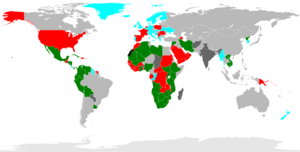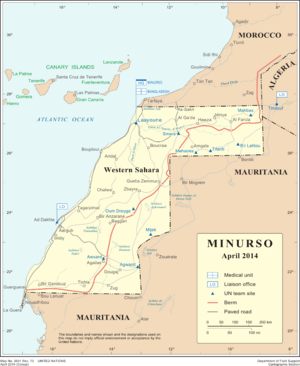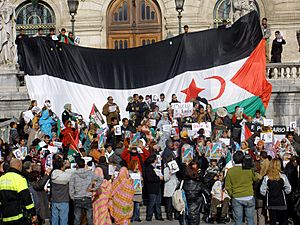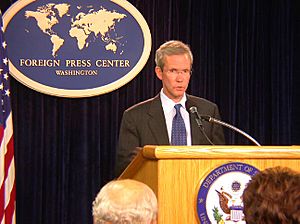Political status of Western Sahara facts for kids
Western Sahara is a territory in North Africa. It used to be a Spanish colony called Spanish Sahara. Now, two groups claim it: the Kingdom of Morocco and the Polisario Front. The Polisario Front is a movement that wants independence for Western Sahara. It is based in Algeria.
Morocco took control of parts of Western Sahara in 1976 and 1979. Many countries and international laws do not see this as legal. The United Nations (UN) still lists Western Sahara as a territory that has not yet gained full independence. The UN sees Spain as the official power in charge, even though Spain left in 1975.
Contents
What is the Western Sahara Conflict About?
Since 1975, Morocco has managed a large part of Western Sahara, calling it the Southern Provinces. The Polisario Front controls another area, known as the Liberated Territories. A small part of the Ras Nouadhibou Peninsula is managed by Mauritania.
A cease-fire (a stop to fighting) has been in place since September 1991. The UN helps to watch over this cease-fire.
Most countries do not officially recognize Morocco's control over Western Sahara. However, some countries support the idea of Western Sahara becoming an autonomous (self-governing) part of Morocco. For example, the United Kingdom treats Western Sahara's status as "undetermined." But, it acts as if Morocco is in charge of the whole area.
The UN is trying to solve the problem. They want to hold a referendum (a vote by the people) through the United Nations Mission for the Referendum in Western Sahara (MINURSO). They are also holding direct talks between Morocco and the Polisario Front. The UN does not recognize either Morocco's or the Polisario Front's claim to Western Sahara.
More than two-thirds of the 500,000 people living in Western Sahara are Moroccan settlers. Moving people into an occupied territory is against international law.
Who Are the Main Groups in the Conflict?
Morocco's View
The Kingdom of Morocco has officially said since 1963 that all of Western Sahara is part of its country. The Moroccan government calls it "Moroccan Sahara" or the "Southern Provinces."
Morocco believes its army fought Spanish colonizers in 1958 and almost freed the area. They say that many Polisario leaders' fathers were part of this Moroccan army. Morocco sees the Polisario Front as a group that wants to separate from Morocco. This is because many of its founding members were originally Moroccan.
In January 2020, Morocco's parliament voted to add Western Sahara's waters to Morocco's sea borders.
Polisario Front's View
The Polisario Front is mainly supported by Algeria. It describes itself as a movement fighting for freedom. It wants to end Morocco's control over Western Sahara. Morocco, however, sees it as a group trying to separate from the country.
The Polisario Front started with students who wanted to end Spanish rule. After Spain left, Morocco and Mauritania took control. The Polisario Front believed the people of Western Sahara should decide their own future and become independent.
The Polisario Front fought against Moroccan and Mauritanian forces. They moved the Sahrawi people (the local population) to refugee camps in Tindouf because the Moroccan Air Force bombed their lands.
The Polisario Front wants the people of Western Sahara to vote on their future through a referendum. The UN does not recognize the Sahrawi Arab Democratic Republic (SADR) as a state. However, since 1979, the UN sees the Polisario Front as a direct participant in the conflict and the true representative of the Sahrawi people.
The Polisario Front argues that Morocco wants Western Sahara for its economic resources. These include fishing, phosphate mining, and possible oil reserves. They also believe it's for political reasons, like keeping the king's position strong. The Polisario Front declared the Sahrawi Arab Democratic Republic (SADR) on February 27, 1976.
Mauritania's Role
Mauritania also had claims on Western Sahara in the 1960s. After Spain left in 1975, the Mauritanian army invaded the southern part of Western Sahara. The Moroccan army invaded the north. In April 1976, Mauritania and Morocco divided the territory. Mauritania got the southern part, called Tiris al-Gharbiyya.
Mauritania fought the Polisario Front for four years. This led to attacks on its capital and a change in its government. Mauritania finally left Western Sahara in 1979. It signed an agreement with the Polisario Front, recognizing the Sahrawi people's right to decide their own future. Mauritania also gave up its claims on Western Sahara. Morocco immediately took control of the area Mauritania had left. Mauritania recognized the Sahrawi Arab Democratic Republic on February 27, 1984.
Algeria's Support
Algeria has supported the independence of all of Western Sahara since 1975. It is one of the few Arab League countries to do so. Algeria has given political and military help to the Polisario Front. Algeria recognized the Sahrawi Arab Democratic Republic on March 6, 1976. Algeria's involvement has caused problems in its relationship with Morocco.
United Nations' Efforts
Western Sahara is on the United Nations list of non-self-governing territories. The UN has been trying to find a solution since 1988. In 1988, Morocco and the Polisario Front agreed to settle the dispute with a referendum. This vote would let the people of Western Sahara choose between independence or joining Morocco.
In 1991, they agreed on a plan for the vote. However, disagreements over who could vote stopped it from happening. The UN has since pushed for talks between Morocco and the Polisario Front. These talks happened in 2007–2008. As of 2020, the UN mission (MINURSO) is still there, but the referendum has not happened.
What Do Other Countries Think?
Some countries support the "right of self-determination" for the Sahrawi people. This means they believe the people should decide their own future. This could include becoming an autonomous part of Morocco. Some countries have changed their minds often or supported both sides.
Many countries that support self-determination also recognize the Sahrawi Arab Democratic Republic. Not all countries that stopped recognizing the SADR have supported Morocco's claims. Most UN member states have not taken a clear side.
Views of UN Security Council Permanent Members
France's Position
France says it is neutral on Western Sahara. However, it helped Morocco and Mauritania during the Western Sahara War. France has also used its veto power to stop the UN from monitoring human rights in Western Sahara. France strongly supports Morocco's plan for Western Sahara to be an autonomous region.
United States' Position
In 2009, the US government under President Obama changed its stance. It moved away from supporting Morocco's autonomy plan. It returned to an earlier position where an independent Western Sahara was still an option.
In April 2009, many US lawmakers asked President Obama to support Morocco's autonomy plan. They said the conflict was a big problem for fighting terrorism in the region. They believed Morocco's plan was the only realistic solution.
However, in 2004, when discussing a trade agreement with Morocco, a US official said that the US does not recognize Morocco's control over Western Sahara. He stated that the trade agreement would not include Western Sahara.
In April 2013, the US suggested that the UN mission (MINURSO) should monitor human rights in Western Sahara. Morocco strongly disagreed and canceled military exercises with the US army. A US ambassador also said that Morocco's autonomy plan could not be the only basis for talks.
On December 10, 2020, President Donald Trump announced that the United States would officially recognize Morocco's claims over Western Sahara. This happened after Morocco agreed to normalize relations with Israel.
Countries with No Stated Position
Many countries have not announced a position on the Western Sahara conflict. These include:
- Americas: Argentina, Bahamas, Chile
- Africa: Eritrea, Tunisia
- Europe: Andorra, Bulgaria, Belarus, Czech Republic, Monaco, San Marino, Liechtenstein, Vatican City, Malta, Luxembourg, Montenegro, Moldova, Lithuania, Latvia, Estonia, Georgia, Armenia, Switzerland
- Asia: People's Republic of China, Indonesia, Kazakhstan, Kyrgyzstan, Palestine, Tajikistan, Uzbekistan, Turkmenistan, Turkey, Pakistan, Nepal, Thailand, Singapore, Japan, Mongolia, Bhutan, Bangladesh, Brunei, Malaysia, Myanmar, Philippines
- Oceania: Australia, New Zealand, Tonga, Samoa, Niue, Palau, Micronesia, Marshall Islands
- Others: Abkhazia, Artsakh, Republic of China (Taiwan), Kosovo, Somaliland, Transnistria
- Sovereign Military Order of Malta
What Do International Organizations Think?
| Organization | What They Think |
|---|---|
| African Union (AU) | The Sahrawi Arab Democratic Republic (SADR) is a full member of the AU. The AU supports the Sahrawi people's right to decide their own future. |
| The SADR is an observer member in the Andean Parliament. | |
| The Arab League supports Morocco's "territorial integrity" but does not say how the conflict should be solved. | |
| This group has not made a clear statement about the conflict. | |
| CARICOM supports the Sahrawi people's right to decide their own future, following UN rules. | |
| Community of Latin American and Caribbean States (CELAC) | CELAC supports efforts to find a fair solution that allows the people to decide their own future. |
| The EU supports UN efforts to find a fair solution that allows the people of Western Sahara to decide their own future. | |
| Non-Aligned Movement (NAM) | NAM supports the Sahrawi people's right to decide their own future, following UN rules. |
| The OIC supports finding a fair solution that allows the people of Western Sahara to decide their own future. | |
| Rio Group | The Rio Group supports UN resolutions to find a fair solution that leads to the Sahrawi people deciding their own future. |
| UNASUR supports finding a fair solution that allows the people of Western Sahara to decide their own future. | |
| The UN does not recognize Morocco's claims. Western Sahara is still on its list of non-self-governing territories. The UN has called for talks between Morocco and the Polisario Front. It has passed many resolutions supporting the Sahrawi people's right to decide their own future. |
The SADR is also a member of the Asian-African Strategic Partnership. This happened despite Morocco's objections.
African Union's View
On February 22, 1982, the SADR became a member of the Organisation of African Unity (OAU), which is now the African Union (AU).
In 1984, Morocco left the OAU because the group recognized the Sahrawi Arab Democratic Republic (SADR).
The African Union fully recognizes the SADR as a member state. The president of the SADR, Mohamed Abdelaziz, was even a vice president of the OAU and AU.
In 2016, Morocco's King Mohammed VI of Morocco said his country wanted to rejoin the African Union. At the same time, 28 African countries signed a petition to remove the SADR from the AU. However, the AU Chairwoman said the AU still supports Western Sahara's independence.
European Union's View
The European Union supports the Sahrawi people's right to decide their own future. However, it does not recognize the Polisario Front. For practical matters like fishing, the EU deals with Morocco as the country that currently has "jurisdiction" (control) over Western Sahara, but not "sovereignty" (official ownership).
In December 2016, the European Court of Justice ruled that Morocco has no claim to Western Sahara. It also said that trade deals with Morocco cannot apply to the occupied territory.
United Nations' View
Since 1966, the United Nations has asked for a referendum to let the local people freely decide their own future. Since 1979, the UN has recognized the Polisario Front as the representative of the people of Western Sahara. It considers Morocco an occupying force.
Former UN Secretary-General Kofi Annan once said that the UN Security Council could not ask parties to negotiate about Western Sahara becoming an autonomous part of Morocco. This is because it would mean recognizing Morocco's ownership, which no UN member state had done.
See also
 In Spanish: Estatus político del Sahara Occidental para niños
In Spanish: Estatus político del Sahara Occidental para niños
- Morocco's Foreign Relations
- Sahrawi Arab Democratic Republic's Foreign Relations
- Countries with Limited Recognition
- Polisario Front
 | Anna J. Cooper |
 | Mary McLeod Bethune |
 | Lillie Mae Bradford |





